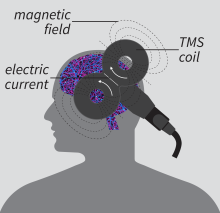Transcranial magnetic stimulation (TMS) therapies have proven to modulate a variety of neuropsychiatric disorders and brain-behavior relationships.
The Koret Human Neuroscience Community Lab is designed to provide investigators across the Stanford campus with access to TMS machines to conduct neuroscientific research in an inclusive, welcoming environment that promotes communication and transparency for participants and care-givers.
- The TMS facility consists of a treatment room, and a waiting area. TMS treatments are provided by a Magventure TMS machine coupled with external neuronavigation sensors and a computer-based neuronavigation software called ‘Localite’. The Cobot TMS robot may be used to automate targeting.
- The combination of the TMS machine, sensors, and software allows researchers to: visualize stimulation areas and record precise positions of the research subject in relation to the TMS treatment coil.
- By utilizing the neuronavigation software and sensors during TMS treatment, researchers are able to deliver pinpointed and replicable TMS treatment to participants based on the participant’s specific neuroanatomy.
